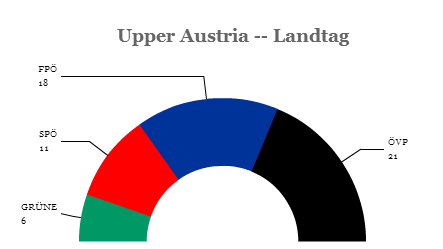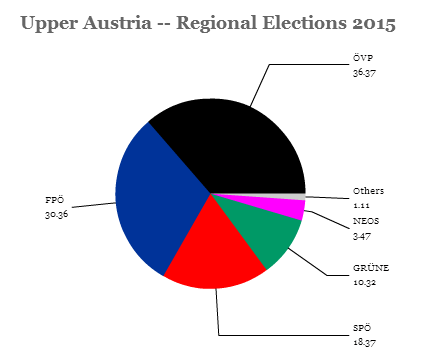
Amid the refugee crisis that has strained European borders, internal and external, since late summer, there’s increasing discussion of using formal diplomatic sanctions against Hungarian prime minister Viktor Orbán for his intransigence in dealing with migrants, many of whom are Syrians fleeing years of civil war or otherwise miserable refugee camps in an overburdened Lebanon.![]()
The last time that the European Union assessed diplomatic sanctions, however, was in 2000, when it chided Austria for letting the far-right Freiheitliche Partei Österreichs (FPÖ, Freedom Party of Austria) into government.
But in the first electoral test for the eastern European countries at the heart of the migrant crisis, it was the FPÖ that emerged as the clear winner, surging 9% to second place in Oberösterreich (Upper Austria)’s regional elections and winning 18 of the regional parliament’s 56 seats.
Its leader, Heinz-Christian Strache, already had reason to be pleased with himself after taking the party to third-place status in Austria’s national parliamentary elections in September 2013.
His party only narrowly lost to the long-dominant center-right Österreichische Volkspartei (ÖVP, Austrian People’s Party), which has controlled the state government since 1945, and whose leader, Josef Pühringer, has served as the state’s governor since 1995. Though its population is just 1.44 million, the state is Austria’s industrial heartland and the country’s third-most populous state, and it borders Germany’s Bavaria and the Czech Republic. The center-left Sozialdemokratische Partei Österreichs (SPÖ, Social Democratic Party of Austria) of Austrian chancellor Werner Faymann fell to third place.
Since 2003, the Austrian People’s Party has governed Upper Austria in a so-called ‘black-green’ coalition with Die Grünen (the Greens/Green Alternative). Though the Greens actually improved on their support from the most recent election in 2009, the ÖVP’s loss of seven seats means that their partnership is two seats short of a majority in the unicameral Landtag. Pühringer will have to form a minority government, looking to the Social Democrats or the Freedom Party for support on a case-by-case basis or otherwise enter into negotiations for a ‘grand coalition’ with the Social Democrats.
Though grand coalitions have become commonplace at the national level, and Faymann currently governs with the support of the Austrian People’s Party, traditional cooperation between the right and the left in Austrian political culture has allowed the Freedom Party to emerge as a more robust alternative to the established political order.
Indeed, if anything, Strache might even be somewhat disappointed in the election results — polls show that the Freedom Party now holds a growing lead (of as much as 10 points) against the two traditional parties of the Austrian right and left. Pühringer himself admitted that asylum was the main issue in the election as Austria struggles alongside its neighbors on the issue. Though Austria agreed to a new EU-brokered deal last week to relocate 160,000 refugees from Greece and Italy throughout the European Union, three of its neighbors (Hungary, Slovakia and the Czech Republic) joined Romania in opposition to the plan. Austria’s share of the total comes to 4,835, but over 15,000 non-nationals were reportedly streaming across the Austrian border in one weekend earlier this month.
Strache, predictably for the leader of a conservative, anti-immigration party, wants to restrict migration from neighboring Hungary and other countries by building a fence along Austria’s border and prioritizing Christian migrants over Muslim ones.
Though support for Strache and the Freedom Party has nudged upwards since the refugee crisis began, the party has been regularly leading poll surveys as early as January 2014, just a few months after the last election. The challenge for Austria’s mainstream parties goes much deeper than simply hoping the migrant crisis will fade from the headlines.
The next national elections are not likely to take place until 2018, Austria’s political elite faces another potential earthquake in just two weeks, when voters in Vienna, the Austrian capital and the most populous state, elect a mayor (who also serves as state governor) and all 100 members of its own state Landtag. Michael Häupl, Vienna’s mayor since 1994, is running for reelection in a state that is just as much a stronghold for the Social Democrats (who have controlled Vienna’s government since 1945) as Upper Austria has been for the People’s Party.
Strache is running for mayor, and though he is not expected to win, given the steady support of the Social Democrats, who also ally with the Greens. But the Freedom Party could come close enough to a victory that it could shake up Austrian politics even more than its October 27 success in Upper Austria. If Strache somehow pulls off a win, it would be a disaster not only for Häupl, but could even jeopardize Faymann’s position as chancellor. A recent Unique Research poll gives the Social Democrats just a lead of 38% to 34% against the Freedom Party, with the Greens winning 12% and the Austrian People’s Party just 8%.

